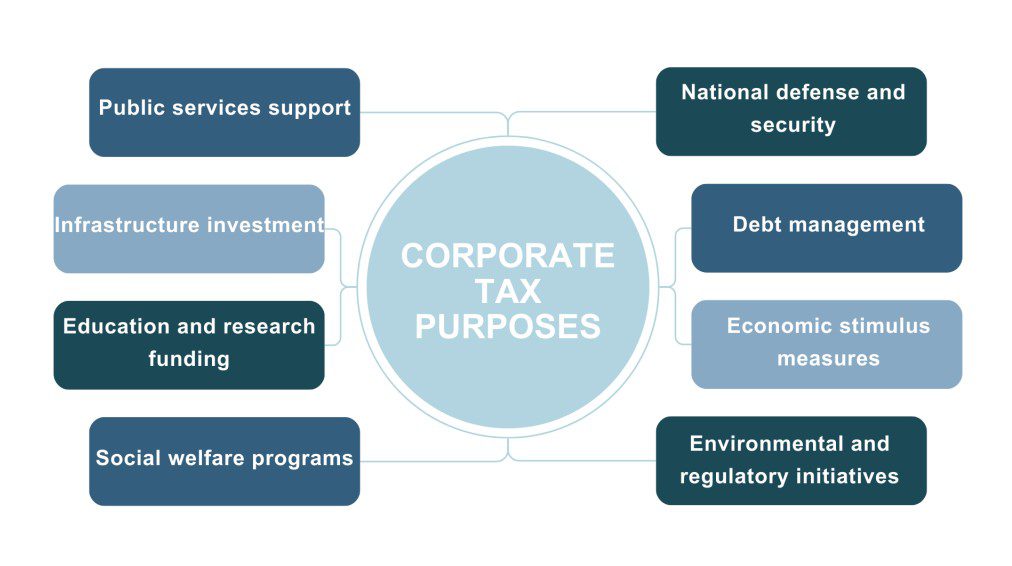 Introduction to Corporate Tax
Introduction to Corporate Tax
Corporate tax is a key factor in any company’s financial structure, impacting how businesses operate and plan their strategies. Understanding corporate tax rates (CTR) is essential for large corporations and smaller businesses looking to expand. Navigate the complexities of taxation in a global economy. We explore the fundamentals of corporate tax, the current corporate tax rate, and what to expect from the corporate tax rate in 2024.
The US CTR is a significant topic in the business world, with implications for businesses of all sizes. Whether you’re a startup or a multinational corporation, understanding the corporate tax landscape can help you make informed decisions that can improve your financial health. As we move toward 2024, many business owners and accountants are keen to know how the corporate tax rate will evolve and how it will affect their bottom line.
What is corporate tax?
Corporate tax is a form of direct tax levied on a company’s profits. It’s charged on the income earned by corporations and is typically one of the most significant expenses a business will incur after operational costs. Corporate tax rates have fluctuated over the years in the US, shaped by economic policies, political shifts, and broader financial conditions.
Corporations are legally obliged to pay taxes based on their profits, calculated by subtracting allowable expenses from their income. The CTR is then applied to the taxable income to determine the amount of tax the company owes. The rate can vary depending on the jurisdiction, business structure, and type of income the corporation generates.
The US Corporate Tax Rate Explained
The US corporate tax rate refers to the percentage of a corporation’s taxable income that is owed to the government as tax. Corporate tax rates in the United States have undergone significant changes in recent decades, particularly with the passing of the Tax Cuts and Jobs Act (TCJA) in 2017. This legislation reduced the CTR significantly from 35% to 21%, reducing corporations’ tax burden.
This rate has remained the standard for several years, but ongoing discussions about potential changes exist. The current CTR in the US remains 21%, though proposals to raise it have been discussed in recent legislative sessions. Understanding this rate is essential for businesses planning to invest, expand operations, or forecast future profits.
Corporate Tax Rate 2024: What Can Businesses Expect?
As we look ahead to 2024, many business owners and accountants wonder whether the CTR will experience any changes. Given the political climate and economic factors, staying informed about potential adjustments is essential. The Biden administration, for instance, has proposed raising the CTR to 28% to fund infrastructure projects and other national priorities.
However, these changes are still under discussion, and the final decision will depend on Congress. In the meantime, businesses should continue to plan based on the current CTR of 21% while keeping an eye on any policy shifts that could affect their tax obligations.
Current Corporate Tax Rate: How It Works for Your Business
The current corporate tax rate of 21% has been in effect since the Tax Cuts and Jobs Act, and it applies to the profits of most corporations in the US. Companies are taxed on their net income, with various deductions, credits, and incentives available to reduce the total taxable amount. For small businesses, the impact of this tax can vary depending on their legal structure (e.g., LLC, S-corp, C-corp), as different entities are subject to different tax treatments.
For example, a C-corporation is taxed at the full 21% rate. At the same time, S-corporations and LLCs typically pass through their income to the owners’ tax returns, meaning the owners are taxed individually. As a result, understanding your company’s structure and its relation to corporate tax is crucial for minimizing your tax liability.
The Impact of Corporate Tax Rate on Business Decisions
The corporate tax rate influences many business decisions, including pricing strategies, investment decisions, and how companies approach expansion. If the tax rate is high, companies may reinvest profits rather than distribute them to shareholders. Conversely, a lower tax rate may make it more attractive for corporations to distribute earnings as dividends or use them for other business ventures.
A change in the CTR can also impact international tax planning. Companies operating in multiple countries must consider the US CTR and foreign tax rates when deciding where to locate operations or subsidiaries. Understanding global tax frameworks is essential for businesses looking to minimize their overall tax burden while remaining compliant with local laws.
What Happens If the Corporate Tax Rate Increases?
Businesses may face higher costs if the corporate tax rate increases, affecting profitability. For example, an increase in the US CTR to 28% could mean a more significant percentage of profits will go toward taxes, reducing the amount available for reinvestment or distribution. This could lead to price increases, reductions in dividends. A slowdown in expansion plans as companies adjust to the new tax landscape.
For smaller businesses or startups, an increase in the corporate tax rate might limit their ability to invest in growth or hire new employees. Companies that successfully navigate these changes will likely stay ahead of regulatory changes and plan their finances accordingly.
The Corporate Tax Rate and Global Competitiveness
One of the most significant concerns for businesses is how the CTR impacts their global competitiveness. Lower taxes can make a country more attractive to investors, as it reduces the cost of doing business. This has been a driving factor behind the recent US CTR reductions. As the country sought to remain competitive with other global markets.
Other countries, like Ireland and Singapore, have attracted foreign investment by offering favorable tax rates. As the CTR changes, businesses must consider the tax climate within the US and international tax policies that could impact their decision-making.
How Businesses Can Plan for Changes in the Corporate Tax Rate
Given the possibility of changes to the CTR in 2024 and beyond, businesses must plan. Here are some strategies that may help mitigate the impact of any tax changes:
- Stay Informed: Keep an eye on the political landscape and proposed tax reforms that could affect your business.
- Tax Planning:. Work with a tax advisor to develop a strategy that minimizes your tax liability, taking advantage of available credits and deductions.
- Reinvest Profits: Consider reinvesting profits into the business to avoid paying additional taxes on dividend distributions.
- Review Business Structure: Depending on your business type, restructuring may offer tax advantages. Consult with professionals about whether you should operate as an S-corp, LLC, or C-corp.
Frequently Asked Questions About CTR
What is the corporate tax rate in the United States?
The corporate tax rate in the United States is currently 21%. This rate applies to most corporations’ taxable income.
How does the CTR affect businesses?
The CTR directly impacts businesses’ profits. A higher tax rate reduces a company’s profit, while a lower tax rate increases profitability and may encourage expansion or investment.
What is the corporate tax rate for 2024?
Currently, the corporate tax rate 2024 is still under discussion, with proposals to increase the rate to 28%. Businesses need to stay informed about potential changes.
What happens if the CTR increases?
If the corporate tax rate increases, businesses may face higher taxes. Which could reduce profits, raise consumer prices, or slow business expansion.
Can small businesses benefit from corporate tax deductions?
Yes, small businesses can use various tax deductions and credits to reduce their taxable income. Such as deductions for operational expenses, research and development, and capital investments.
How can I minimize my corporate tax liability?
Working with a tax advisor to take advantage of deductions, credits. And other tax planning strategies can minimize liability. You can also consider reinvesting profits or changing your business structure to reduce taxes.
Conclusion: Navigating Corporate Tax Rates in a Changing Landscape
The CTR significantly shapes business strategies and decisions. Understanding the US CTR and staying informed about potential changes in 2024 will ensure businesses can adapt to a dynamic financial environment. The current tax rate is 21%, but ongoing discussions about increasing the rate highlight strategic importance. Planning in managing tax liabilities.
To navigate these changes successfully, businesses must stay ahead of the curve with proactive tax planning and investment strategies. A deep understanding of both local and international tax implications. By staying informed, working with tax professionals, and adopting the right approach to corporate taxes. Businesses can thrive even in a shifting tax landscape.




